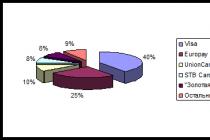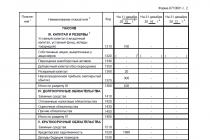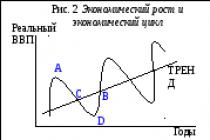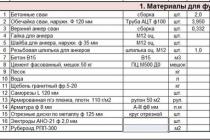Agreement on the use of site materials
Please use the works published on the site for personal purposes only. Publication of materials on other sites is prohibited.
This work (and all others) is available for download free of charge. Mentally, you can thank its author and the staff of the site.
Send your good work in the knowledge base is simple. Use the form below
Students, graduate students, young scientists who use the knowledge base in their studies and work will be very grateful to you.
Similar Documents
Study of the activities and powers of the Ministry of Finance of the Russian Federation, the federal executive body. Development and implementation of strategic directions of a unified financial policy. General management of the organization of finance in the country.
presentation, added 01/20/2015
The concept of subjects of the Russian Federation in the constitutional and legal aspect. The main types of subjects of the Russian Federation, state of the art their constitutional and legal status. constitutional legal framework equality of subjects of the Russian Federation.
term paper, added 12/08/2013
Definition and classification of subjects commercial activities as persons having rights and performing duties arising from trade relations. Analysis of methods and mechanisms for exercising the rights and legitimate interests of commercial entities.
test, added 02/17/2011
General concept observance and protection of the rights and legitimate interests of subjects of financial legal relations. Administrative, court orders protection of subjects of financial legal relations. Features of protection of the rights of subjects of tax, budgetary and currency relations.
test, added 03/02/2011
The system of financial authorities of the Russian Federation. Powers of the President and the Government in the field of finance. Functions of the Ministry of Finance. Goals of the Bank of Russia. Responsibilities Federal Treasury. Tasks of the Accounts Chamber and the Federal Service for Taxes and Duties.
term paper, added 01/01/2010
Structure financial system Russian Federation. Principles, methods and content financial activities state, the main tasks of the Ministry of Finance. Concept and legal framework monetary circulation. Rules of conduct cash transactions at enterprises.
test, added 03/21/2010
Budget powers, rights and obligations of the subjects of the Russian Federation (RF). Competences of subjects of the Russian Federation in the field of their own budget, in relations with the federal and local budgets. Budgetary competence of public authorities of the constituent entities of the Russian Federation.
term paper, added 05/27/2010
The state budget is an estimate (painting) government revenue and spending by source of income and main channels of distribution.
Depending on the state structure The budget is different.
Federal
Republican
The main one in our country is the federal budget. The formation of the state budget is associated with a special, fiscal policy states Zerkin D.P., Ignatov V.G. Fundamentals of the theory of public administration. - RnD .: Phoenix, 2010. - P.163.
Fiscal policy is the deliberate manipulation of the state budget through spending, taxes, loans in order to improve the socio-economic situation in the country. According to the nature of the impact on the economy, there are stimulating and restraining fiscal policies.
Stimulating - the policy of tax cuts. This policy creates incentives for work, for savings and investment, for innovation, thus stimulating the growth of national production.
Restraining - the policy of increasing the tax burden. However, this policy is beneficial mainly in the face of the threat of inflation, in order to restrain further price increases with high taxes.
The federal budget is formed by the government and adopted by the State Duma. During the discussion of the budget, the estimated revenues and expenditures of the state are discussed, industry and regional interests are taken into account, financing of state projects and programs is provided, including
Fight against monopoly, encouragement of competition, support for small and medium-sized businesses
Rational use of resources
Maintaining the exchange rate of the national currency
Preservation of the trade balance
Measures to curb inflation and unemployment
Poverty alleviation programs Aliev I. M. Economics: textbook. for bachelors / Aliev I. M., Gorelov N. A., Ilyina L. O. - M.: Yurayt, 2013. - P. 199.
The budget is thus a tool for achieving and maintaining economic stability.
Budgetary systems currently include the budgets of the central government, regional bodies and local governments. Government revenues are determined mainly by taxes. The sources and structure of budget revenues determine the economic relations formed between the state, enterprises, organizations and citizens in the process of fulfilling the main financial fund countries - the state budget.
The form of manifestation of the presented economic relations are different kinds payments of organizations, enterprises and population in the state budget, and their tangible embodiment - the funds mobilized in the budget fund.
Budget revenues, on the one hand, are the result of the distribution of the value of the social product among various participants in social reproduction, and on the other hand, they are the object of further distribution of the value determined in the hands of the state, since the latter is used to form budget funds for territorial, sectoral and targeted purposes. Revenues of budgets related to the budget system are formed at the expense of fixed and regulating revenue sources, as well as direct financial assistance in various forms and other income in accordance with the law on the budget for the study fiscal year. Income is impersonal, except as otherwise provided by special legislation.
A significant part of tax revenues is credited to the federal budget; taxes and fees are assigned to regional and local budgets, the collection of which is low.
The creation of budgets of all levels is carried out at the expense of tax and non-tax revenues. Proceeding from this, optimal fiscal federalism should be implemented primarily on the basis of optimal tax system states.
Taxes are the main form of public revenue mobilization in countries with market economy. In the budgets of central governments, they form from 70 to 90% of all revenues; in local budgets, the share of these revenues is usually about 50%. Due to taxes and fees redistributed through the state budget, a part of financial resources state and municipal enterprises (in the Russian Federation - unitary enterprises) and a number of special funds Vasilenko I.A.: State and municipal government. - M.: Gardariki, 2012. - P.219.
Income federal budget determined by:
1) federal taxes, fees and non-tax revenues - in accordance with the norms for deductions established by the Budget Code of the Russian Federation;
2) other non-tax income in accordance with the norms of deductions;
3) federal taxes and fees (in terms of repayment of debts of previous years on certain types taxes, as well as in terms of repayment of debts on canceled taxes and fees).
Taxes are the main source budget revenues at all levels budget system, determine not only the parameters of itemized financing of expenditures, but also form the basis for the territorial redistribution of financial resources. Reform needed interbudgetary relations between the center and the subjects of the federation, municipalities, the main directions of which are the isolation of each link in the budget system of the Russian Federation and the elimination of the dependence of the budgets of the subjects of the Russian Federation on the federal budget, as well as the introduction of the expenditure concept of building the budget of the Russian Federation. From these positions fiscal policy should be aimed at balancing the interests of the center and territories, determining clear proportions of distribution tax payments on the links of the budgetary system Kudina M.V. Economics / Kudina M.V., - M.: Forum; Infra-M, 2012. - P.123.
The development of the state budget is under the jurisdiction of the government of the Russian Federation, the executive authorities of the constituent entities of the Russian Federation and municipalities. An essential role in the drafting of the budget is played by the forecast of social economic development Russia and the territories, which, in turn, are growing based on the data of the socio-economic development of the territories.
The very work of drafting the budget is carried out by the Ministry of Finance of the Russian Federation and its financial authorities, as well as tax and customs authorities.
The development of the budget takes place in several stages:
The first stage of the development of the draft budget (3 months). At this stage, the following is done:
Development of a socio-economic development forecast;
Formation of the consolidated balance of financial resources;
Identification of priority areas of budget policy;
Calculation of project control figures.
When developing the budget for the coming year, different methods are used:
Method economic analysis. Establishes the degree of implementation of the budget for the last year and determines the degree of implementation for the current year, identifying the reasons for the deviation.
normative method. This method is based on the norm for determining the item of expenditure. By multiplying the natural unit by the norm, the total amount of expenses is determined.
The extrapolation method determines financial indicators based on their dynamics, reporting data for previous years and divides the amounts received into next year Veliyev Z. T. Formation of the state budget of the Russian Federation on the basis of targeted budget programs // Young scientist. 2011. №2. T.1. S. 84.
During this period of drafting the budget, the authorities of the constituent entities of the Russian Federation must submit requests and justifications for receiving subventions from the federal budget.
The second stage of the draft budget development (4 months) includes the analysis of all the presented indicators and calculations.
On the basis of these analyses, the Ministry of Finance forms the control figures for the draft federal budget.
Further, the submitted document is sent to the executive authorities of the constituent entities of the Russian Federation. The heads of these structures may submit their proposals for changing specific indicators of the draft federal budget.
At the third stage, the government of the Russian Federation draws up a draft budget planning. By law this document must be completed within two months.
The budget message includes:
The main indicators of the socio-economic development of the Russian Federation for the corresponding year;
Consolidated financial balance throughout the country; information on government revenues;
The main directions of budget policy;
Draft federal budget of the Russian Federation;
Consolidated budget of the Russian Federation;
Evaluation of the use of the budget of the past and current financial years.
According to the Constitution of the Russian Federation, the government submits the draft federal budget for consideration to the State Duma before September 1. The budget message is subject to publication in the open press.
The State Duma adopted the Russian budget for 2015-2017 in the third reading. The budget deficit is planned at 0.6% of GDP for all three years.
The draft budget was drawn up on the basis of a macroeconomic forecast that assumes economic recovery: accelerating GDP growth to 1.2% in 2015, to 2.3% in 2016 and to 3% in 2017.
Inflation is set at 5.5% in 2015, 4.5% in 2016 and 4% in 2017. The average annual dollar exchange rate in 2015 is planned at the level of 37.7 rubles. .
Budget revenues in 2015 are planned at the level of 15.082 trillion rubles. (19.5% of GDP), expenses - 15.513 trillion rubles. (20% of GDP), deficit - 430.718 billion rubles. (0.6% of GDP).
For 2016, revenues of 15.796 trillion rubles are included. (19% of GDP), expenses - 16.272 trillion rubles. (19.6% of GDP), deficit - 476.3 billion rubles. (0.6% of GDP).
In 2017, the budget will receive 16.548 trillion rubles. (18.4% of GDP). Expenses will amount to 17.089 trillion rubles. (19% of GDP), deficit - 540.9 billion rubles. (0.6% of GDP).
The base oil price should be $96 per barrel in 2015-2017. The price of Urals oil in 2015-2017 is projected at $100 per barrel.
Introduction.
The state budget as a phenomenon in the history of human society appeared relatively recently - in the era of capitalism (feudalism did not know a single document that would unite all state revenues and expenditures). Its appearance is associated with the separation public finance from the finances of the monarch, by limiting the power of the latter, by the transition to democratic foundations for managing state and public life. The budget in all countries of the world serves as the basis of public finance and the main fund of the state's money.
In terms of material content, the budget is the centralized fund itself. Money states. In the legal aspect, the state budget acts in the form of a law, which is adopted by the highest legislative body of the country.
The political significance of the budget is multifaceted, and in particular, it consists in how the legislature approves the volumes of budget revenues and expenditures for the planned year, and thus the people's representatives implement the will of the people.
The structure of the state budget, its essence and functions.
intervention in the economy;
defense of the country.
All these functions are largely possible thanks to the financial system.
The principles of the budget system are its fundamental principles and rules: unity, completeness, reality, publicity and independence of all budgets included in the budget system 1 .
STATE BUDGET - 1) centralized fund at the disposal of the state monetary resources intended for financial support of the activities of the state and local governments; 2) the financial plan of the state, which has the status of law for the relevant financial year. It is the central link in the budget system of modern countries.
The budget system depends on the form of state and administrative structure of the country. In unitary states, the budget system consists of two main parts - the state and local budgets, in federal - from three - the federal budget, budgets of subjects (parts) of the federation and local budgets. Sometimes local budgets are in turn subdivided into separate levels. Such a division exists, for example, in the USA.
In accordance with Article 10 of the Budget Code of the Russian Federation, the budget system of modern Russia consists of budgets of three levels:
The federal budget and state budgets off-budget funds;
Budgets of subjects of the federation and budgets of territorial off-budget funds.
Functions of the state budget:
Regulates the cash flows of the state, strengthens ties between the center and the subjects of the federation
Legally controls the actions of the government
Carries information about the intentions of the government to participants in economic activity
Specifies parameters economic policy and sets the framework for possible government action
In view of the special importance of the state budget for all spheres of economic life, its preparation, approval and implementation take place at the level of laws. At the same time, the state budget itself is a law.
Almost every economic institution (enterprise, firm, branch of the economy, bank, economic and financial funds, etc.) has a plan for collecting income and using expenses. All socio-political institutions (government organizations, political parties, etc.) also have budgets.
The state budget serves as a prerequisite and financial basis for the functioning of the state and the implementation by it of those functions that society has authorized it to perform. With the help of the budget, issues of financial regulation at the macro level and on the scale of the entire economy are solved. The economic significance of the budget lies in the fact that it forms a significant part of the final demand (due to its funds, most of the income from the population is formed, large volumes of products are purchased, and state reserves are created). Significant financial flows pass through the budget, it directly affects the formation of important economic indicators (Fig. 27):
Rice. 27. The impact of the state budget on the main economic indicators.
State budget revenues - the final stage cash flows coming from the real sector and other major areas of financial relations, and state budget expenditures are the starting point for the movement of state resources to the needs outlined by the state and society (Fig. 28).

Rice. 28. The main directions of income and expenditure of the state budget.
A balanced budget is a budget in which the ratios of income and expenses are equal.
If revenues and expenditures in the budget differ, then the budget deficit or surplus.
The budget deficit is the amount by which the government's spending exceeds its revenues.
A budget surplus is the amount by which government revenues exceed its spending. Surplus occurs quite rarely, most often there is a budget deficit. That is, for the implementation of all expenses, it is necessary to find additional funds. These funds come from sources of financing the budget deficit.
Sources of financing the budget deficit
Domestic funding:
release and sale valuable papers(bonds and bills)
budget loans received from budgets of other levels
use of central bank funds
External funding:
sale of securities on the global financial market
loans from foreign banks and international financial organizations
foreign government loans
Together, domestic and external funding make up total funding.
Budget requirements:
The budget should not have a rigid binding of income to expenses. The government should be able to freely decide which tasks are top priorities and in what ways to solve them. This ensures the flexibility of economic policy.
There must be a hierarchy of budgets. That is, the federal budget should not include flows from other levels. This contributes to the autonomy of budgets.
The budget should include all revenues and expenditures controlled by the government.
The procedure for the development and adoption of the state budget
Budgeting - determination of the amount of funds necessary for the financial support of the functions assigned to state authorities and local self-government. The draft state (federal) budget is developed by the Ministry of Finance. In our country, this work begins in January of the previous year. At the first stage of drafting the budget, scenario conditions for socio-economic development for the next year are developed. After their approval by the Government, the Ministry of Finance develops the main characteristics of the federal budget revenues and expenditures for the planned year. At the second stage, the distribution of budgetary funds is carried out according to the articles budget classification, as well as their targeted distribution among the main managers of budgetary funds.
In modern Russia, these activities must be completed before July 15. After that, until August 15, the Government and other executive authorities study the forecast for the socio-economic development of the Russian Federation and the draft federal budget, making changes and additions.
Budget review consists of several stages. At the first stage, the Government submits the budget for consideration to the State Duma of the Federal Assembly of the Russian Federation. At the second stage, the Council of the State Duma sends the bill to the State Duma Committee on Budget, Taxes, Banks and Finance. There materials are considered by deputies with participation of officials, economists, scientists. At the third stage, the draft federal budget is sent to the President, to other committees of the State Duma, and also to the Accounts Chamber for conclusion. In him Accounts Chamber describes the results of checking the legality and validity of the expenditures and revenues included in the draft federal budget. After consideration of the budget in parliamentary committees, it is submitted to meetings of the State Duma, which adopts it in four readings.
On first reading:
The State Duma discusses its general qualitative characteristics: the concept and forecast of the socio-economic development of the Russian Federation for the next financial year, the main directions of the budget and tax policy for the next financial year, the main principles and calculations on the relationship between the federal budget and the budgets of the constituent entities of the Russian Federation, the draft program of state external borrowing of the Russian Federation in terms of sources of external financing of the federal budget deficit, as well as the main characteristics of the federal budget, which include:
- revenues of the federal budget by groups, subgroups and articles of the classification of revenues of the budgets of the Russian Federation;
- distribution of income from federal taxes and fees between the federal budget and the budgets of the constituent entities of the Russian Federation;
– federal budget deficit in absolute figures and as a percentage of federal budget expenditures for the next financial year and sources of covering the federal budget deficit;
- the total volume of federal budget expenditures for the next financial year.
On the second reading:
its expenditures are approved according to the sections of the functional classification of expenditures of the budgets of the Russian Federation within the limits of the total volume of expenditures of the federal budget approved in the first reading, and the amount of the Federal Fund for Financial Support of the Subjects of the Russian Federation. The State Duma considers the said bill in the second reading within 15 days from the date of its adoption in the first reading.
Third reading:
The State Duma approves federal budget expenditures, classifying into subsections what budgetary funds should be spent on and who should carry out these expenditures. The State Duma considers the draft law on the federal budget for the next financial year within 25 days from the date of adoption of this bill in the second reading.
Fourth reading:
The Duma is considering amendments to the law, as well as the quarterly distribution of income, expenses and deficits.
Approval of the state budget.
The federal law adopted by the State Duma is submitted to the Federation Council. After its adoption by the Federation Council, it is signed by the President and made public.
Budget execution is the act of discovering and using budget funds. Since 1992, treasury execution of the federal budget has been introduced in Russia, i.e. There is a single body for the execution of the budget - the Federal Treasury. In the event that in the process of budget execution it is necessary to change any of its articles, then these changes are adopted in the form of a law. This makes it impossible for the Government of the Russian Federation to freely manipulate funds and change budget priorities without the consent of the State Duma.
Budget control.
An important stage of the budget process is the control over the execution of the budget. Control over the execution of the state budget is carried out by representative authorities (parliamentary control), and executive authorities (administrative control).
In Russia, parliamentary control is exercised by the Accounts Chamber, created by the Federal Assembly, which conducts inspections in ministries, departments and enterprises related to the formation and execution of the federal budget, as well as the use of budgetary funds. It submits quarterly reports to Parliament on the progress of budget execution and gives an annual opinion on the Government's report on the execution of the state budget.
Conclusion.
The state budget is a centralized fund of monetary resources necessary to perform the functions of the state. These functions are reduced to the redistribution of funds and control over their effective use. In this sense, the functions of the budget are similar to the functions of finance, which is understandable, since the budget is only part of the whole. At the same time, in relation to the state budget, it is customary to single out the following functions related to the state structure:
intervention in the economy;
maintenance of the state administrative apparatus;
law enforcement and judiciary;
medicine, health care and education;
defense of the country.
The state budget is not in vain called the leading link in the country's financial system - after all, it combines the main revenues and expenditures of the state. The budget is the main financial planning document of the state for the current year, which has the force of law.
List of used literature
Budget Code of the Russian Federation. official text, current edition. M., "Exam", 2004
Finance. Textbook for high schools. - Ed. G.D.Polyak. 2nd ed., revised. and additional M., UNITY-DANA, 2003
Vyshegorodtsev M.M. Budget management. Lecture course. M., "Business and Service", 2002
1 Dobrynin A.I., Tarasevich L.S. Economic theory. St. Petersburg: SPbGUEF, 2001, p. 75
budget Republic of Kazakhstan (1) Abstract >> FinanceDeficit limits budgets.1 Composition and structure state budget RK I. INCOME ... services. Besides, Adoption obligations state institutions and making payments...largely because his order not defined by the Constitution. However...
1. (President of the Russian Federation)
2. (State Duma)
3. (Government of the Russian Federation)
4. (Ministry of Finance of the Russian Federation)
The composition of the Government of the Russian Federation, in addition to its Chairman and Vice-Chairmen, also includes
1. (officials heading the highest executive body of state power of a constituent entity of the Russian Federation)
2. (federal ministers)
3. (heads of federal executive bodies)
4. (all listed)
The government of the Russian Federation is formed for a term
1. (powers of the President of the Russian Federation)
The structure of the federal executive authorities is approved by
1. (President of the Russian Federation on the proposal of the Prime Minister)
2. (State Duma)
3. (Federation Council)
4. (Chairman of the Government of the Russian Federation)
40. Of the listed types of acts: 1) decrees; 2) resolutions; 3) orders - the Government of the Russian Federation has the right to issue:
Of the listed types of federal executive bodies: 1) the Federal Ministry; 2) State Committee; 3) federal Service; 4) Federal Commission; 5) Federal oversight - conducting public policy and the implementation of management in the established field of activity is within the competence
42. The definition "federal executive body exercising special (executive, control, licensing, regulatory and other) functions in the established areas of jurisdiction" - refers to the concept
1. (Federal Service of Russia, Russian agency)
2. (Federal Ministry)
3. (Government of the Russian Federation)
4. (State Committee of the Russian Federation, Federal Commission of Russia)
43. Of the listed executive authorities: 1) the Government of the Russian Federation; 2) Federal Ministry; 3) State Committee; 4) regional administration - general competence endowed with:
44. Of the listed executive authorities: 1) the Government of the Russian Federation; 2) Ministry of Health of the Russian Federation; 3) Ministry natural resources Russian Federation; 4) regional administration; 5) regional financial management - special (sectoral or intersectoral) competence is vested in:
A certain part of the legal status of collective subjects of administrative law, consisting of the following elements: 1) rights and obligations associated with the exercise of power, participation in managerial relations; 2) jurisdiction, legal consolidation of the range of objects that are subject to authority - is called
1. (competence)
3. (functions)
46. Of the listed executive authorities: 1) financial management; 2) health committee; 3) Headquarters Central Bank Russian Federation; 4) state tax office; 5) military registration and enlistment office - the structure of the regional, regional administration includes:
47. Of the listed executive authorities: 1) the Committee for Culture; 2) regional financial department; 3) regional military registration and enlistment office; 4) the state tax inspectorate - the territorial bodies of the federal executive power include:
48. Definition: "A one-man executive body with general competence, operating within a certain state-national, administrative-territorial unit, which is a subject of the Russian Federation" - refers to the concept
1. (administration)
2. (department)
3. (local government)
4. (department)
The system of executive authorities in the Russian Federation consists of
1. (federal executive authorities and executive authorities of the constituent entities of the Russian Federation)
2. (of the President of the Russian Federation, the Government of the Russian Federation, federal ministries and departments)
3. (Government of the Russian Federation, Governments of the republics within the Russian Federation, regional, regional, city administrations)
4. (federal executive authorities, executive authorities of the constituent entities of the Russian Federation and local governments)
Of the listed executive authorities: 1) the Government of the Russian Federation; 2) the highest executive body of state power of a constituent entity of the Russian Federation; 3) Federal Ministry; 4) State Committee; 5) administrative commissions - collegiate bodies are
51. Of the listed executive authorities: 1) the Government of the Russian Federation; 2) Federal ministries; 3) State committees; 4) regional, regional administrations - single-management bodies are:
Executive authorities are divided into collegiate and one-man, depending on
1. (order of education)
2. (nature of competence)
3. (the procedure for resolving subordinate issues)
4. (territories of activity)
53. Executive authorities in which issues under their jurisdiction are resolved personally by the head this body, are
1. (one-man)
2. (collegiate)
3. (territorial)
4. (federal)
The administrative powers of the executive authorities are exercised through
1. (execution of laws)
2. (publication of legal acts of management)
3. (processing and transmission of information)
4. (all of the above)
Which of the following authorities according to the Constitution of the Russian Federation are not included in the system of executive authorities?
1. (City (district) administration)
2. (Regional administration)
3. (Administration of the Autonomous Okrug)
4. (Russian agency)
How can decisions of local governments be canceled or invalidated?
1. (Can only be canceled by the President of the Russian Federation)
2. (May be invalidated by the Government of the Russian Federation)
3. (Can be canceled only by the bodies that accepted them or invalidated by a court decision)
4. (May be canceled by the prosecution authorities)
Is the presence of any bodies or officials of local self-government in accordance with federal law mandatory?
1. (Positions of the head municipality}
2. (Elective bodies of local self-government)
3. (Other (executive) bodies of local self-government (for example, local administration))
4. (All specified bodies and officials is mandatory)
Drafting of the federal budget. The drafting of the federal budget is carried out by the Government of the Russian Federation in accordance with the budget policy of Russia, defined in the Budget Address of the President of the Russian Federation, and begins no later than 10 months before the start of the next financial year.
The procedure and terms for drawing up the draft federal budget, as well as the procedure for working on documents and materials that are mandatory for submission simultaneously with the draft federal budget, are determined by the Government of the Russian Federation. Budget Code RF defines only the main stages of drafting the budget.
The first stage in the formation of the federal budget is the development by the federal executive authorities and the selection by the Government of the Russian Federation of a plan - a forecast of the functioning of the economy for the next financial year, containing the main macroeconomic indicators characterizing the state of the economy.
Based on the plan chosen by the Government of the Russian Federation - a forecast of the functioning of the economy of the Russian Federation for the next financial year, the Ministry of Finance of Russia develops the main characteristics of the federal budget and distributes federal budget expenditures for the next financial year in accordance with the functional classification of expenditures of the budgets of the Russian Federation and projections of the main incomes and expenditures of the federal budget on the medium term.
The Ministry of Finance of Russia within the established period from the date of adoption by the Government of the Russian Federation of the main characteristics of the federal budget and the distribution of federal budget expenditures for the next financial year: 1)
sends budget projections to federal executive bodies for distribution to specific recipients of federal budget funds; 2)
notifies the executive authorities of the constituent entities of the Federation of the methodology defined by Russian legislation for the formation of interbudgetary relations between the Russian Federation and the constituent entities of the Federation for the next financial year and for the medium term.
The second stage of the formation of the federal budget - distribution by federal executive bodies limits budget financing for the next financial year, as well as the development by the said bodies of proposals for structural and organizational reforms in the sectors of the economy and social sphere, on the abolition of regulatory legal acts, the execution of which entails the expenditure of budgetary funds that are not secured by real sources of funding in the next financial year, on the suspension of the said regulatory legal acts or on their phased introduction.
At the same time, the authorized executive body draws up a list of federal target programs to be financed from the federal budget in the next financial year, coordinates the volume of their financing in the coming year and in the medium term.
Uncoordinated issues on budget projections for the coming year and for the medium term are subject to consideration by an interdepartmental government commission headed by the Minister of Finance.
Development and approval by the federal executive authorities of the indicators of the draft federal budget for the next financial year, documents and materials submitted simultaneously with it, bills on minimum size wages, on the minimum amount of state pensions, on the indexation procedure wages employees of the public sector and state pensions in the next financial year, as well as compiled as an annex to the project federal law on the federal budget for the next financial year of the list of legislative acts (articles, individual paragraphs of articles, subparagraphs, paragraphs), the effect of which is canceled or suspended for the next financial year due to the fact that the budget does not provide funds for their implementation, are completed by due date.
The Government of the Russian Federation is considering the forecast of the socio-economic development of the Russian Federation for the next financial year and the updated parameters of the forecast socio-economic Development of the Russian Federation for the medium term, the draft federal budget and draft budgets of state non-budgetary funds for the next financial year, the draft long-term financial plan, other documents and materials characterizing the budgetary and financial policy in the next financial year and for the medium term, submitted by the Ministry of Finance of the Russian Federation, Ministry of Economic Development and Trade of the Russian Federation, other federal executive bodies, and approves the draft federal law on the federal budget for submission to the State Duma of the Russian Federation.
Consideration and approval of the federal budget. It should be noted that on this moment there is a stable procedure for consideration and approval of the federal budget, provided for by the RF BC. Today it looks like this.
The Government of the Russian Federation, prior to the consideration of the draft budget, along with the draft law on the federal budget, submits the following documents to the State Duma of the Russian Federation: 1)
main directions of budgetary and tax policy for the next financial year and planning period; 2)
preliminary results of the socio-economic development of the Russian Federation for the past period of the current financial year and the expected results of the socio-economic development of the Russian Federation for the current financial year; 3)
forecast of the socio-economic development of the Russian Federation for the next financial year and planning period; four)
assessment of the expected execution of the federal budget for the current financial year; 5)
forecast of the main parameters of the budget system of the Russian Federation; 6)
explanatory note; 7)
calculations according to the articles of classification of federal budget revenues and sources of financing the federal budget deficit.
In addition, draft amendments and additions to tax legislation must be submitted along with the draft federal budget.
Before consideration of the draft federal law on the federal budget in the first reading this project discussed in committees and commissions of the State Duma. Proposals concerning the draft law are summarized in the Committee on Budget and Taxes, which prepares an opinion on the draft federal budget and submits it to the State Duma for consideration.
The draft federal budget is considered by the State Duma in three readings.
When considering the draft in the first reading, which must take place within 30 days from the date of submission of the draft budget, the State Duma considers the concept, forecast of socio-economic development, the main directions of budget and tax policy and approves the main indicators of the federal budget.
If the draft federal budget is rejected in the first reading, a conciliation commission is formed from representatives of the State Duma, the Federation Council and the Government of the Russian Federation, which submits the revised draft federal budget for consideration by the State Duma again in the first reading. In addition, the State Duma may return the project to the Government or raise the issue of no confidence in the Government.
When considering the draft federal budget in the second reading, which must take place within 35 days from the date of adoption of the document in the first reading, the State Duma discusses and approves appropriations by sections of the budget classification, etc.
15 days after the adoption of the document in the second reading, when discussing the draft budget in the third reading, the budget expenditures are approved by subdivisions of the budget classification.
In the future, the process of approving the draft federal budget takes place in the manner prescribed by the Constitution of the Russian Federation.
If the federal law on the federal budget is not adopted before January 1, the Ministry of Finance of the Russian Federation exercises temporary management of the federal budget for the first quarter.
Execution of the federal budget. Budget execution is practical implementation budget for all provided indicators of its revenue and expenditure parts. Execution of budgets refers to the functions of the executive branch of government. In the process of budget execution, the Minister of Finance of the Russian Federation may authorize the redistribution of federal budget funds by sections, subsections, types of expenses and subject items within the funds allocated to the main administrator or recipient of federal budget funds, in the amount of not more than 10% of the appropriations allocated to the main administrator of federal budget funds .
The operational execution of the budget is carried out in accordance with the consolidated budget list (list of income and expenses), approved by the Ministry of Finance of the Russian Federation and transferred to the Federal Treasury for execution. Prompt execution of the budget consists in taking measures for the receipt of planned revenues, in providing financial resources for the activities provided for by the budget list, control over their correct use.
Everyone participates to some extent in the execution of the budget. government bodies, budgetary and other organizations. However, the most significant role in this area belongs to financial authorities, especially the Federal Tax Service, responsible for collecting taxes, and the Federal Treasury, which carries out the treasury execution of the federal budget.
In the case of the treasury execution of the federal budget, the registration of receipts, the regulation of the volume and timing of the adoption of budget obligations, the issuance of an authorization letter for the right to make expenditures within the allocated limits of budget obligations, and the implementation of payments on behalf of the recipients of federal budget funds are assigned to the Federal Treasury. The execution of the federal budget is carried out on the basis of the reflection of all operations and funds of the federal budget in the system of balance accounts of the Federal Treasury. In the process of executing the federal budget, it is prohibited to carry out operations bypassing the system of balance accounts of the Federal Treasury.
The main task of the Federal tax service, which is under the jurisdiction of the Ministry of Finance of the Russian Federation, is to monitor compliance with the legislation on taxes and fees, the correct calculation, completeness and timeliness of paying taxes and fees to the appropriate budget. As can be seen from the definition, this service mainly ensures the execution of the revenue part of the budget. To do this, she is endowed with essential rights: 1)
carry out checks of monetary documents, accounting books, reports, plans related to tax accounting, receive the necessary information, certificates, explanations; 2)
inspect warehouse, trade and other premises of enterprises and citizens; 3)
suspend operations on settlement and other accounts in banks in case of failure to submit accounting reports, balances, calculations and other documents; four)
apply financial sanctions to enterprises, institutions, organizations and citizens, impose administrative fines and etc.
The key role in budget execution belongs to the Federal Treasury, which is also structural unit Ministry of Finance of the Russian Federation. Its main tasks are: 1)
control over the execution of the federal budget; 2)
management of income and expenditures of the federal budget on the accounts of the Treasury in banks; 3)
collection, processing and analysis of information on the state of public finances, etc.
To implement these tasks, the Federal Treasury: 1)
organizes the budget and financial performance federal budget; 2)
communicates to the territorial bodies of the Federal Treasury the amounts of appropriations from the federal budget for the territories served by these bodies; 3)
maintains a consolidated register of managers of federal budget funds; four)
organizes and implements short-term forecasting of federal budget funds; 5)
organizes and maintains a consolidated record of operations on the movement of federal budget funds; 6)
organizes and manages the revenues and expenditures of the federal budget.
Direct work on targeted financing of organizations, on the implementation of operations with federal budget funds is carried out by the territorial bodies of the Federal Treasury.
Bodies of the Federal Treasury are endowed with quite serious rights, in particular, the right to suspend operations on the accounts of organizations using federal budget funds in case they commit certain violations. financial discipline, the right to recover from legal entities in an indisputable manner federal budget funds used for other than their intended purpose, etc.
Functions for control and supervision in the financial public sector is carried out by the Federal Service for Financial and Budgetary Supervision, which is under the jurisdiction of the Ministry of Finance of the Russian Federation. In particular, the Federal Service for Financial and Budgetary Supervision exercises control and supervision of:
1) for the use of funds from the federal budget, funds from state extra-budgetary funds, as well as material assets that are in federal ownership; v, 2) compliance by residents and non-residents (with the exception of credit organizations and currency exchanges) currency legislation of the Russian Federation; 3)
execution by the authorities financial control federal executive authorities, state authorities of the subjects of the Federation, local governments of the legislation of the Russian Federation on financial and budgetary control and supervision.
The Federal Service for Financial and Budgetary Supervision carries out, within its competence, proceedings on cases of administrative offenses in accordance with the legislation of the Russian Federation, etc.
In order to exercise powers in the established field of activity, the Service has the right to: 1)
check in organizations receiving federal budget funds, money documents, registers accounting, reports, plans, estimates and other documents, the actual availability, safety and correctness of the use of funds, securities, material assets, as well as receive the necessary written explanations of officials, financially responsible and other persons, certificates and information on issues arising in the course of audits and inspections, and certified copies of documents necessary for the implementation of control and supervisory activities; 2)
conduct in organizations of any form of ownership that have received funds from the audited organization, material values and documents, comparison of records, documents and data with the corresponding records, documents and data of the audited organization (counter verification); 3)
send to the inspected organizations, their higher bodies mandatory submissions or binding instructions to eliminate the identified violations; four)
exercise control over the timeliness and completeness of the elimination by the audited organizations and (or) their higher authorities of violations of the law in financial and budgetary sphere, including through voluntary reimbursement of funds, etc.
Execution of the expenditure part of the federal budget. It is connected with the distribution of federal budget funds. The right to dispose of funds allocated from the budget is granted by law to the heads of organizations, which are called managers of budgetary funds. Managers of budgetary funds are divided into main and subordinate. The main managers include state bodies, local governments, etc. of the Russian Federation. The subordinate ones include the heads of organizations receiving funds from the main managers for distribution among subordinate organizations, as well as the heads of organizations receiving these funds for their intended use.
Federal budget funds are spent in various forms and for various purposes (for example, providing loans to foreign states, etc.), but the bulk of the funds are distributed through financing, which means the provision of federal budget funds at the disposal of organizations on the basis of irrevocable and gratuitousness.
Financing is most often carried out on the principles of purposefulness, in other words, the funds provided to organizations are strictly special purpose(payment of wages, scholarships, reconstruction of a building, etc.).
Forms of budget financing.
/. Financing of state (unitary) enterprises. State-owned enterprises now act as independent economic entities whose activities are aimed at making a profit. The state most often cannot interfere in economic activity unitary enterprises. As a general rule, an enterprise must meet its costs through own funds. Therefore, budget financing should not be the main source of funds for an enterprise, but it is necessary for unprofitable, but socially significant enterprises.
2. Estimated budget financing of institutions. Institutions are not for profit legal entities and therefore, as a rule, do not have own income or their volume is not significant. Therefore, all expenses of institutions are covered by the budget on the basis of financial plans- cost estimates that establish the volume, target direction and quarterly distribution of funds allocated from the budget. Expenditure items are mandatory and cannot be changed at the will of the head of the institution. Institutions that are on budgetary financing include institutions of education, healthcare, science, bodies of the Ministry of Defense of the Russian Federation, the state apparatus of the Russian Federation, and law enforcement agencies.














